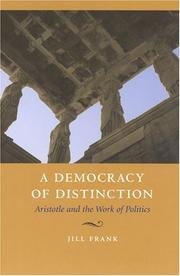| Listing 1 - 7 of 7 |
Sort by
|
Book
ISBN: 022651577X 9780226515779 9780226515632 Year: 2018 Publisher: Chicago : The University of Chicago Press,
Abstract | Keywords | Export | Availability | Bookmark
 Loading...
Loading...Choose an application
- Reference Manager
- EndNote
- RefWorks (Direct export to RefWorks)
Reading --- Philosophy, Ancient. --- Philosophy. --- Plato. --- Plato --- Platon --- Aflāṭūn --- Aplaton --- Bolatu --- Platonas --- Platone --- Po-la-tʻu --- Pʻŭllatʻo --- Pʻŭllatʻon --- Pʻuratʻon --- Πλάτων --- אפלטון --- פלאטא --- פלאטאן --- פלאטו --- أفلاطون --- 柏拉圖 --- 플라톤 --- Платон --- プラトン
Book
ISBN: 022651580X 9780226515809 9780226515632 9780226515779 Year: 2018 Publisher: Chicago : University of Chicago Press,
Abstract | Keywords | Export | Availability | Bookmark
 Loading...
Loading...Choose an application
- Reference Manager
- EndNote
- RefWorks (Direct export to RefWorks)
When Plato set his dialogs, written texts were disseminated primarily by performance and recitation. He wrote them, however, when literacy was expanding. Jill Frank argues that there are unique insights to be gained from appreciating Plato's dialogs as written texts to be read and reread. At the center of these insights are two distinct ways of learning to read in the dialogs. One approach that appears in the Statesman, Sophist, and Protagoras, treats learning to read as a top-down affair, in which authoritative teachers lead students to true beliefs. Another, recommended by Socrates, encourages trial and error and the formation of beliefs based on students' own fallible experiences. In all of these dialogs, learning to read is likened to coming to know or understand something. Given Plato's repeated presentation of the analogy between reading and coming to know, what can these two approaches tell us about his dialogs' representations of philosophy and politics? With Poetic Justice, Jill Frank overturns the conventional view that the Republic endorses a hierarchical ascent to knowledge and the authoritarian politics associated with that philosophy. When learning to read is understood as the passive absorption of a teacher's beliefs, this reflects the account of Platonic philosophy as authoritative knowledge wielded by philosopher kings who ruled the ideal city. When we learn to read by way of the method Socrates introduces in the Republic, Frank argues, we are offered an education in ethical and political self-governance, one that prompts citizens to challenge all claims to authority, including those of philosophy.
Reading --- Philosophy, Ancient. --- Philosophy. --- Plato. --- Republic. --- authority. --- desire. --- persuasion. --- philosophy. --- poetry. --- politics. --- self-governance.

Abstract | Keywords | Export | Availability | Bookmark
 Loading...
Loading...Choose an application
- Reference Manager
- EndNote
- RefWorks (Direct export to RefWorks)
Constitutional history --- Constitutional history [Modern ] --- Constitutional law--History --- Constitutionele geschiedenis --- Constitutions--History --- Democracy --- Democratie --- Démocratie --- Geschiedenis [Constitutionele ] --- Histoire constitutionnelle --- Inspraak in het beleid --- Overlegcultuur --- Self-government --- Political science --- Political philosophy --- Equality --- Representative government and representation --- Republics --- Constitutional history, Modern --- Constitutional law --- Constitutions --- History --- Philosophy --- Aristotle. --- Aristoteles --- Aristote --- Aristotle --- Aristotile --- Aristoteles. --- Contributions in political science --- Arisṭāṭṭil --- Aristo, --- Aristotel --- Aristotele --- Aristóteles, --- Aristòtil --- Arisṭū --- Arisṭūṭālīs --- Arisutoteresu --- Arystoteles --- Ya-li-shih-to-te --- Ya-li-ssu-to-te --- Yalishiduode --- Yalisiduode --- Ἀριστοτέλης --- Αριστοτέλης --- Аристотел --- ארסטו --- אריםטו --- אריסטו --- אריסטוטלס --- אריסטוטלוס --- אריסטוטליס --- أرسطاطاليس --- أرسططاليس --- أرسطو --- أرسطوطالس --- أرسطوطاليس --- ابن رشد --- اريسطو --- Pseudo Aristotele --- Pseudo-Aristotle --- アリストテレス
Book
ISBN: 9780823294251 Year: 2021 Publisher: New York, NY
Abstract | Keywords | Export | Availability | Bookmark
 Loading...
Loading...Choose an application
- Reference Manager
- EndNote
- RefWorks (Direct export to RefWorks)
Digital
ISBN: 9780823294251 Year: 2021 Publisher: New York, N.Y. Fordham University Press
Abstract | Keywords | Export | Availability | Bookmark
 Loading...
Loading...Choose an application
- Reference Manager
- EndNote
- RefWorks (Direct export to RefWorks)
Book

ISBN: 9780823237296 Year: 2009 Publisher: New York, NY
Abstract | Keywords | Export | Availability | Bookmark
 Loading...
Loading...Choose an application
- Reference Manager
- EndNote
- RefWorks (Direct export to RefWorks)
Multi

ISBN: 9780823237296 9780823230303 Year: 2009 Publisher: New York, N.Y. Fordham University Press
Abstract | Keywords | Export | Availability | Bookmark
 Loading...
Loading...Choose an application
- Reference Manager
- EndNote
- RefWorks (Direct export to RefWorks)
| Listing 1 - 7 of 7 |
Sort by
|

 Search
Search Feedback
Feedback About UniCat
About UniCat  Help
Help News
News